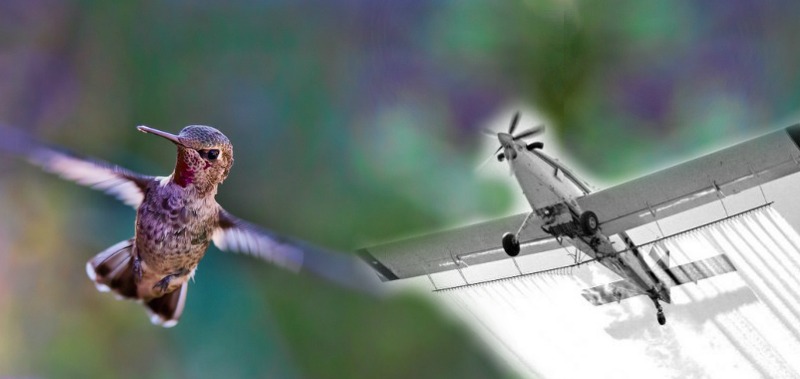 Brandon Turbeville
Brandon TurbevilleNatural Blaze
March 26, 2018
Some species of North American hummingbirds are experiencing a sharp decline and many are now wondering whether pesticides are playing a role.
One individual concerned about the decline and the role insecticides may be playing in it is British Columbia research scientist Christine Bishop who works with Environment and Climate Change Canada. She began looking at different factors that could be contributing to the decline of the hummingbirds and began taking urine and feces samples (in a way that did not harm the birds) to determine whether or not pesticides could be found.
"No one has ever measured pesticides in hummingbirds before. So we decided to try it," she. "It turns out, to our surprise actually, that the birds are obviously picking up pesticides in their food, which can be nectar and also insects."
What she found was a concentration of pesticides to the tune of 3 parts per billion.
"Now what does it mean? Right now we're just understanding what the level of exposure is, and then how is it affecting the population, well that's part of the population dynamics," she said.
The research was focused on the agricultural region of the Fraser Valley and Southern British Columbia which is the core habitat for the rufous hummingbird.
The annual breeding bird survey demonstrates that between the years of 1966-2013, the rufous population on the Pacific Coast declined by an average of 2.67% per years. The survey showed that the Allen’s and broad-tailed hummingbirds were also declining.
Health Canada claims it is aware of Bishop’s work and is looking into the matter. It says it plans to publish its own findings in 2018 but many who are aware of Health Canada’s corrupt nature and close relationship with Big Ag are not so sure the agency will be on the up and up.
Regardless, Bishop is moving forward with more research and is 3 years in to a five year study to determine the relationship between the decline and the pesticides. She said that hummingbirds, like bees, return to the same places to find food and they are able to remember where specific flowers are located. She said there are concerns that pesticides may actually disrupt their memory.
But there also questions as to whether or not the decline is solely due to pesticides. Habitat loss, plants blooming at different times of the year, and increasing deer populations could all be factors.
"But what's interesting about this is ... more and more people are putting out feeders, yet the population is still declining," she said.
Recently, research revealed a massive decline in bird populations in France and the EU which was linked to insecticide use.
This article (Pesticides May Now Be Dropping Hummingbird Populations Too) was created by and appeared first at Natural Blaze. It can be reshared with attribution but MUST include link to homepage, bio, intact links and this message.
Get a nifty FREE eBook – Like at Facebook, Twitter and Instagram. Can republish but MUST include author name + link back at the TOP, links and bio intact. Must include this message!

Brandon Turbeville – article archive here – is an author out of Florence, South Carolina. He is the author of six books, Codex Alimentarius — The End of Health Freedom, 7 Real Conspiracies,Five Sense Solutions and Dispatches From a Dissident, volume 1 and volume 2, The Road to Damascus: The Anglo-American Assault on Syria,and The Difference it Makes: 36 Reasons Why Hillary Clinton Should Never Be President. Turbeville has published over 1,000 articles dealing on a wide variety of subjects including health, economics, government corruption, and civil liberties. Brandon Turbeville’s podcast Truth on The Tracks can be found every Monday night 9 pm EST at UCYTV. He is available for radio and TV interviews. Please contact activistpost (at) gmail.com.
No comments:
Post a Comment
Note: Only a member of this blog may post a comment.